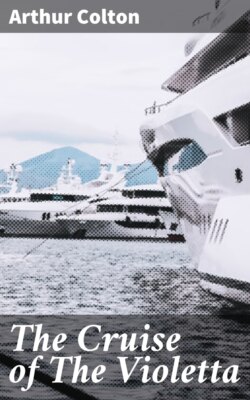Читать книгу The Cruise of The Violetta - Arthur Willis Colton - Страница 8
На сайте Литреса книга снята с продажи.
CHAPTER IV—THE TROPIC AND THE TEMPERATE
ОглавлениеTable of Contents
WHEN a chicken drinks,” said Dr. Ulswater, “he lifts his head and thanks God, but when a man drinks he doesn't say anything. That is a West-Indian proverb.”
I said: “It's a good proverb.”
“Well,” he went on, “I should say it was, with the chicken, possibly, so to speak, a somewhat mechanical ritual.”
We were nearing the end of our cruise. I never wanted less to go back to Portate, but my health was too boisterously good to be denied. It was toward the end of November. In the land of steadfast people, the frost would be on the grass, the wind in the yellow corn-shocks, the good folk gathering to their annual feast of gratitude, far from these lazy seas. Old women with white hair and knitting, old men walking with canes, pink-cheeked girls and big-handed men, children storming the banisters—they would all be there.
“What will you do on Thanksgiving day?” I asked, thinking of the cool cornfields and familiar faces, of farm-yards and houses where chickens used to drink in prayerful attitudes, where men also thanked God when they drank, or ate.
“I have left it to Mrs. Mink. She is considering it.”
“How?”
“She is considering me. It amounts to the same thing. Her decision, I should say, would determine my attitude on the question of gratitude.”
“What do you mean?”
“I have requested her to consider me matrimonially,” he said. “I fear she is considering me in the light of Foreign Missions.
“I have presented to Mrs. Mink,” he continued, “as bearing on the point, one of the clearest analogical arguments you ever saw. It is as follows: The business of the tropic and temperate zones is to entertain and supplement each other. They trade experiences—as they trade crude rubber for sewing machines—to the profit of both parties. Put them together and there arises in the mind of each a sense of romantic surprise. Providence has supplied the need of man for permanent astonishment by a trifling gradation of heat, so that when either shall feel the need for something miraculous and incongruous, it has only to find the other. I have pointed out to Mrs. Mink that her sailing in the tropics was only falling in with this arrangement of Providence, and she was pleased to hear it. Going about on loose seas in lazy climates sometimes had seemed to her a lax and disorderly kind of conduct, and having it attached that way to Providence made her feel better. I said to Mrs. Mink: 'It's a doctrine of the present age that the tropics are best administered and managed, for the good of all, by the temperate zone. Civilisation is now tending to that end. Now, you, Mrs. Mink, are a temperate zone. I am a tropical one. You have administrative ability. I am a heterogeneous person, untidy, overflowing, and hankering to be administered. You are the one, I am the other. Hence our mutual functions, destinies, relations to each other, have been arranged and foreordained by Providence. Quod erat demonstrandum.' That was my argument to Mrs. Mink.”
I said: “It's a good argument. How does she like it?”
“Mrs. Mink,” he said, “is reflective but unconvinced. The extent to which she is unconvinced is alarming. I can't deny it.”
I left them the day after Thanksgiving, at San Juan in Porto Rico, and went back to Portate. Singular town, Portate. Singular man, Dr. Ulswater. Singular planet around which the Violetta was setting out with its critical, exploring prow.
It was some two months after, when I received Dr. Ulswater's first letter. Altogether he sent me four letters. Letters! rather manuscripts, documents, written in his own mellow and tumultuous style. They made that wandering hearth and home of the Violetta a vivid enough picture to my mind. I followed its course from sea to sea, from island to island, wishing myself aboard her. Here follow the documents.
